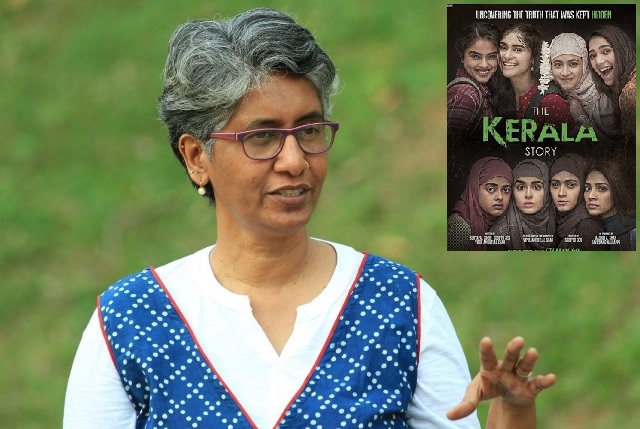Asha Achy Joseph, a filmmaker and academic, says the movie is problematic as it projects the core elements of a religion through the lens of extremism. Her views:
About The Kerala Story, at the outset one could say that the film’s text concerns the narrative of a Hindu girl who happens to love a Muslim boy and is cheated by him for an ulterior motive. The story unfolds to the audience as first-person narrative of the young woman after she is captured as a militant from an international border somewhere around Afghanistan. The film revolves around the factual evidence of ISIS converting young people to be used for their religious and political goals. The narration works generally through flashbacks.
In the subtext, we realise that the filmmaker’s focus is not on the love story, nor on the militant’s story — but on something else! We feel the filmmaker is not sure if he wants us to know the complete story. The lack of professionalism in genuinely engaging with the content is obvious. The audience is forced to look upon the core elements of a religion through the lens of religious extremism. They are then coerced into believing that any number of such cases can occur, is occurring, and it is all under cover. Clearly, fear is being induced, calling it “real incident”.
It is funny to see how this kind of film-making is taking the support of non-fiction to mislead the audience with the rhetoric of real-life story. This is a clear case of a below average text, thoroughly under-researched and lacking in details, with a subtext that has the clear agenda of religious and political polarisation.
This film intends to grab attention through extreme stereotypes and cliché from a national audience which is familiar with Bollywood entertainment guidelines. If the content had been made in Malayalam, it would have flopped on the first day, first show in the state. In Kerala, we make more than 200 films per year and the audience has good taste in choosing content. Also, a sizable population is inclined towards analysing films within the framework of international standards, and is tuned in with the regular film festival culture.
In Kerala, the general tendency has been to ignore the film. I watched the film on the first day; mostly, there were Hindi-speaking cosmopolitan audience, or workers from Hindi-speaking states. The theatre hall with around 200 seats was not full. Outside the theatre, there was police protection and I could see a couple of posters put up by protestors against the film.
ALSO READ: ‘The Kerala Story Weaponises The Conversion Issue’
Discussion on this film brings us to a typical post-truth scenario. A filmmaker is misrepresenting an event in recent history, claiming that a large number of people are affected in this region, and projecting his film/oneself as the saviour. He is using the ‘reality element’ to twist truth and we know that is what is called propaganda!

Polarisation can happen through positive or negative description of a phenomenon. In this film, in the guise of sounding a genuine alarm against the gruesome acts of extremist groups, the filmmaker is conveniently ‘othering’ communities. Here it is done through the alienation of other religions from the majority religion and we know that this is the political goal of Hindutva. By alienating a large number of people from ‘other’ religions, the propagandists are envisioning a political climate of intolerance.
I would say the filmmaker is lucky to have chosen Kerala as the geographical area of this story. I am not sure if it were a story placed in any other state, could he have avoided inducing physical violence within the communities around? Through the release and run of this film without any violent incidents in Kerala, the country must take note that we have secured a democratic space for dialogue and debate, irrespective of the topic.
A last word about the perception of the filmmakers about women in Kerala: We are women who have shown exceptional models to the country; be it local self-government or micro- finance management or health-care or education. By no means of fiction, can the rest of the country undervalue us. The young women shown in this film does not do justice to the dignity of our young women as empowered citizens. We may be falling in or out of love, but that does not give anyone the license to portray us anyhow, according to their perceptions, or whims and fancies!
The narrator is the Dean of School of Communication at the Sacred Heart College in Kochi, Kerala. She is a state and national awardee in film-making and television content production
Read More: lokmarg.com
As told to Amit Sengupta
